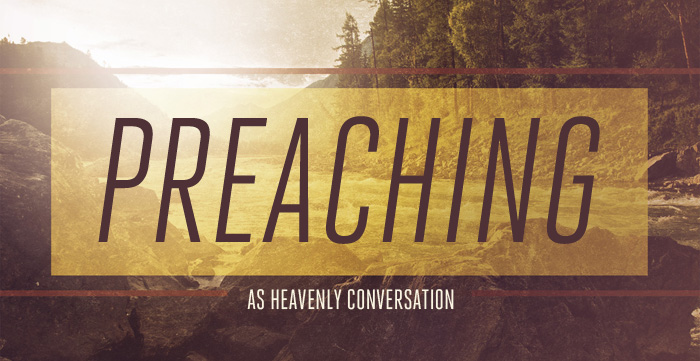R.E.O. White once talked about ineffective preaching as being “a monstrous monologue by a moron to mutes.” He was on to something. For the best preaching, while appearing to be a monologue on the surface, is in fact a silent dialogue between the preacher and his hearers.
I’m not thinking here of conversational preaching as the preacher and congregation physically speak back and forth to one another during the sermon.1 Instead, I have in mind the spiritual—unspoken—conversation happening while he preaches and they listen.
Tone Is Something, But Not Everything
We must recognize from the outset that dialogical preaching is not merely a matter of tone. Sure, some preachers have unique personalities and moods especially suited to creating spiritual, unspoken conversation during an exposition (Tim Keller comes to mind here). So tone is important. But if you’ve ever listened to a Matt Chandler sermon you know he’s got about one volume level in delivery—LOUD—and he still effectively draws in his hearers. Thus, tone isn’t everything.
What then are some things preachers might do, if tone isn’t the silver bullet, to stir up silent dialogue in their preaching?
Helps to Conversational Preaching
The first non-negotiable is knowing the sheep. Everything that follows in this post assumes a pastor has a vibrant, growing knowledge of those entrusted to his care. Preaching week after week to the same congregation will lose its fresh power if the pastor isn’t increasing in his awareness of the flock’s spiritual condition. How else can he speak to their current experience? How else can he wisely and pointedly apply the text? Knowing the sheep is the cornerstone of conversational preaching.
A second friend is anticipating objections. This Saturday I hope to preach on 1 John 2:18-27, which includes this little puzzler, “But the anointing that you received from him abides in you, and you have no need that anyone should teach you” (1 Jn. 2:27). The current draft of my manuscript asks at this point, “What does John mean here about not needing teachers? Has he just put all preachers like me out of a job?” Anticipating objections invites the hearer into the conversation the preacher has had with the text all week.
One caution on this point is in order: we ought not insert common objections scholars have about a text that not of our people have. For example, maybe you are preaching through a series on the pastoral epistles. At the outset you could say something like, “The objections to Pauline authorship deserve serious consideration and are as follows . . .” Now, maybe you think you’ve just served to increase silent dialogue, but in reality you’ve likely inserted doubt into places it had never before existed. The commentators will quibble where the average laymen doesn’t. Furthermore, the immediate objections my church has to Paul’s great gospel teaching in Ephesians 2:1-10 will likely be somewhat different than those of a mainline church in San Francisco. Anticipate then the objections your people will have.
In his masterful Between Two Worlds John Stott writes,
One of the greatest gifts a preacher needs is such a sensitive understanding of people and their problems that he can anticipate their reactions to each part of his sermon and respond to them. Preaching is rather like playing chess, in that the expert chess player keeps several moves ahead of his opponent, and is always ready to respond, whatever piece he decides to move next.
Another aid for feeding the spiritual dialogue is using rhetorical questions. Sprinkle these liberally throughout your sermon just as you should douse tortilla chips with a healthy dose of salt. Rhetorical questions can be used during explanation, illustration, and application. Last week I preached a sermon on not loving the world from 1 John 2:15-17 and asked near the start, “What do you think about the world? What comes to mind when you hear Christians and churches speak about the topic of ‘worldliness’?” After walking through John’s warning about the dangerous power of worldliness I asked, “Have you noticed your love for God waning recently? Did you feel your devotion and joy in Christ vanish this week? Our text says it’s probably because your love for the world is raging in fresh ways.”
We can ask questions we intend to answer from the text or ask questions we intend the hearer to answer from his or her experience. Rhetorical questions tease out understanding, cement meaning, and challenge the mind to think specifically.
A final tool on the topic is something I’ll call conditional application. Don’t be afraid to say something like, “If you’re in here today and are not a Christian . . .” or, “Maybe you feel embittered toward God.” These conditional statements are launching pads for not only pointed application, but for specific silent dialogue. They summon particular individuals to attention with what’s about to come in the sermon. We could think of conditional applications as personal invitations to encounter God’s truth.
The Point of It All
Conversational preaching is preaching that connects and confronts. It connects the hearer’s inner experience to the objective content of God’s word. It confronts the hearer with God’s word by calling for responses suitable to the individuals spiritual state.
Revelation and response.
Connection and confrontation.
Declaration and dialogue.
May this be our aim when we ascend to the sacred desk.
———————————————————————————————–
- You’d have to do something crazy with κηρύσσω (keruso; Greek for “to preach,”) to turn heralding God’s word completely into dialoging about God’s word. ↩

